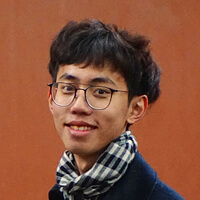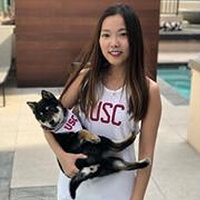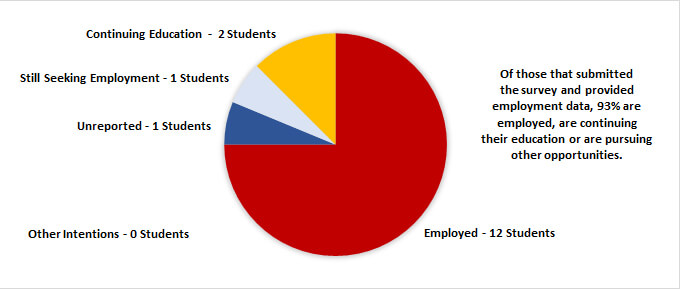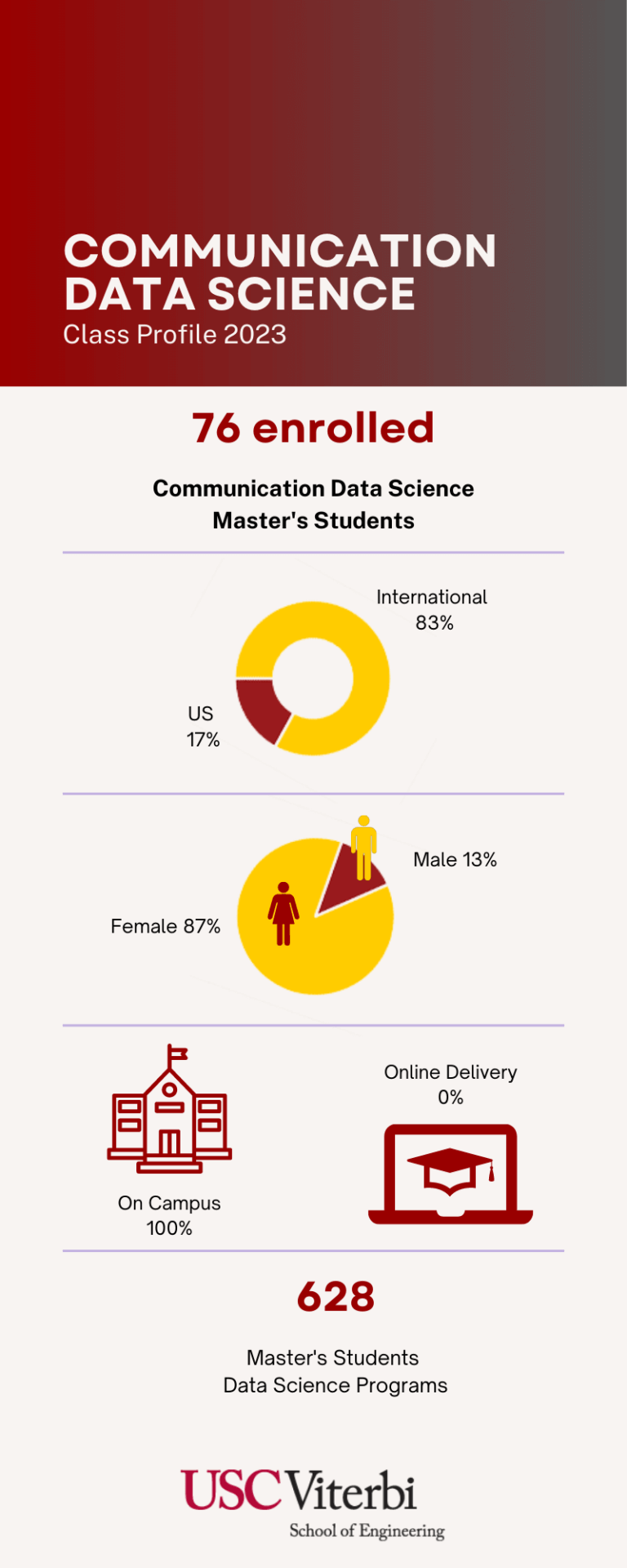The Master of Science in Communication Data Science is a cross-disciplinary joint degree program offered by the Viterbi School of Engineering and the Annenberg School for Communication and Journalism.
You will acquire a data-native mindset and a unique skill set that prepares you for a career spanning communication, content strategy and data analytics.
In a rapidly changing world where gathering, interpreting and analyzing data is increasingly essential, modern organizations are seeking professionals who can leverage both data and theory to shape their communication strategies. This first-of-its-kind degree program is situated in one of the world’s premier hubs for the technology and media industries. Offered jointly by USC Annenberg and the USC Viterbi School of Engineering, the program blends advanced courses on media, marketing, and the human and social aspects of communication with foundational computer programming courses and advanced courses on data science, machine learning, data visualization, human-computer interaction, data stewardship, and AI ethics.
The data-native mindset you will acquire in this STEM-designated degree program will equip you to lead diverse, interdisciplinary project teams in delivering solutions to a broad range of stakeholders.
The curriculum is designed to be accessible to students with any background, including students with a communication background and no computer science knowledge as well as students with a computer science background and no communication knowledge. Students with undergraduate degrees in computer science, engineering, science, or mathematics will acquire the necessary knowledge of communication through the curriculum and can request to replace introductory data science courses with more advanced ones. Students with undergraduate degrees in communication, journalism, or social sciences will acquire formal and practical data science skills and a solid background in communication theories needed for data science.
Upon successful completion of the MS in Communication Data Science program students will be able to:
- Elicit requirements for data science needs in an organization.
- Design advanced data systems to collect, aggregate, and analyze data and information
- Leverage data and theory to inform communication strategy.
- Effectively communicate complex data and results to a broad and diverse range of stakeholders.
- Combine narrative and visualization skills to tell compelling data-driven stories that support diverse perspectives.
- Successfully lead a diverse, interdisciplinary project team in a data-rich communication environment.
- Learn fundamental concepts of data science that facilitate keeping abreast of the latest technological developments in a rapidly changing world.
APPLICATION DEADLINES
| SEMESTER | DEADLINE |
| Fall | December 15 |
Visit our Ready to Apply page for more information
ELIGIBILITY CRITERIA
Bachelor’s degree from an accredited institution. Students with a bachelors degree in communications, journalism, social sciences, engineering or computer science are welcome to apply.
Applications are reviewed holistically; simply taking these courses does not guarantee admission.
APPLICATION REQUIREMENTS
The following materials are required to be included with your online application:
- Transcripts
- Resume/CV
- Personal Statement
- Letter of Recommendation (1 required)
NOTE: The GRE is not required for 2024 applications. A decision on the GRE requirement for 2025 has not yet been made.
The following link will take you to an overview of the tuition & fees for graduate engineering students, including payment information.
TUITION AND FEES OVERVIEW
Estimated Cost of Attendance - 32 Unit Program
.This downloadable Cost of Attendance document breaks down the tuition and fees by semester. Although the actual number of courses taken each semester may vary by student as can the amount of time taken to complete the program, it can be submitted to banks and scholarship institutions.
 ANDREW LI
ANDREW LI
What were the main reasons you chose to pursue this graduate program at USC?
Because the Communication Data Science program is one of the kinds in the country and it perfectly combines the data science skills with communication theory. It is a STEM program, which increases my opportunity to find a job in the United States. Personally, I want to switch my career path to data analyst and data scientist.
Tell us about an exciting and unforgettable experience from your two years at USC.
I think it must be the moment when I cheered the victory of USC football team at the student section of LA Memorial Coliseum with fellow Trojans.
What are some personal achievements or experiences you’d like to share?
I have met many wonderful and great friends all over the world in this program. I also have learnt coding in Python and SQL, which I had never thought that I was able to learn several years ago.
Which organizations/activities have you been involved with outside of the classroom?
I am now a student assistant at Viterbi Admission & Student Engagement office, where I helped my supervisor with marketing work for graduate programs. I also used to join a research team under the Viterbi CSSE center to improve my coding skills last summer, which I recommend all students who have no background in coding to try since it is a great opportunity for us to open the data science world.
What advice would you give future Viterbi students?
First, try to connect with current student from the program via LinkedIn or Viterbi Student Ambassador program so you could learn the real information and experience studying in the program. Secondly, learn some introductory math, and statistical courses by taking elective courses from your undergraduate college or using online resources. Finally, research the industry, and try to find out what you want to do after graduation even before you enroll in the program.
.
.
 GRADY GU
GRADY GU
Tell us a bit about yourself! Where are you from, where have you lived, worked, and studied?
I grew up in Shanghai and came to the US for college when I was 18. I graduated from USC Annenberg with a bachelor’s degree in communication in 2016. After that, I joined one of the biggest advertising firms worldwide and started working as a broadcast manager in West Hollywood. Working in the media industry has taught me a lot about maintaining client relationships, telling good stories, and working in a fast-paced industry.
What attracted you to come to USC and the communication data science program?
After working as a broadcast manager for a year, I realized that my passion is still around technology and innovation. However, I was nervous that my B.A. degree would not be the best step towards a MS program. After doing some research on the USC website, I found the Communication Data Science program, which is perfect for students who want to study STEM without a STEM background. I was able to keep improving my knowledge in the communication field while learning new knowledge on the data science side.
What are some classes or professors that shaped your time at USC?
I strongly recommend COMM528, Web Designs for Organizations, taught by Professor Freddy Nager. He is one of the most inspiring professors I have met. He always encourages students to speak up in class and he teaches very practical knowledge, like how to optimize your Linkedin profile to attract more recruiters, how to boost website traffic through search engine optimization, and how to improve website usability to facilitate more transactions. I still utilize these skills at work frequently. The second class I highly recommend is DSCI549, Introduction to Computational Thinking and Data Science. I was very nervous to study data science at first because I did not have a bachelor’s degree in science. However, this course has taught me all the fundamentals of computer and data science and I was able to “speak their language” after one semester. I would say this course is a “get your foot in the door” course.
Outside of class, what did you do at USC? Were you involved in any organizations, did you spend a lot of time exploring LA, or did you do any extracurriculars?
I started working part-time as an associate product manager for a tech startup when I was still in school. The program was very helpful as I was taking web design, app design, and coding classes and these are exactly the skills I needed for that role. It was the most fruitful period of my life, as I was learning new skills from school while practicing them at work.
What are your short-term and long-term plans?
Short-term plans: work on as many projects as possible to maximize my learnings at this current stage of my career. Long-term plans: develop a disruptive product that benefits society.
What's a piece of advice you'd give to graduate students?
Be open-minded. I had no clue what my dream job was during my first year in grad school. I started an internship as a project manager at a tech startup and the co-founder (who is also a Trojan) saw the potential in me of developing good products. He offered me this associate product manager role, when I didn't even know what developing a product was like. However, after thinking about it for one day, I chose to take the challenge and step out of my comfort zone. After a few months of learning, I realized that being a product manager is my dream job and it was the wisest decision I had ever made.
2022 First Destinations Survey - Outcomes*

Alumni Employment - 2022*
(Companies & Job Titles)
- 247 Group - Social Analyst
- Applied Materials, Inc. - Technical Marketing Analyst
- Blue Focus - Overseas Marketing
- Deloitte - Business Technology Solutions Analyst
- EY - Technology Consultant
- Icon Media Direct - Junior Media Analyst
- J.P. Morgan Chase & Co. - Business Analyst
- On Location - Scheduling Assistant
- Proxima Beta U.S. LLC - Marketing Intern
- Shopee - e-Commerce Category Specialist
- University of Southern California - Research Assistant
- Wayfair - Technical Marketing Analyst
- Western Digital - Sales Data Analyst
.
Internships (Summer 2023)**
Amazon, Analysis Group, Dell Technologies, FOX Corporation, Interpret
.
* Information is based on a voluntary survey and should not be interpreted as a comprehensive view of the 2022 graduating class.
** Internship data is from CPT internships done by our international student population.
This degree is not available on DEN.
Please complete the following form for more information.



 ANDREW LI
ANDREW LI GRADY GU
GRADY GU